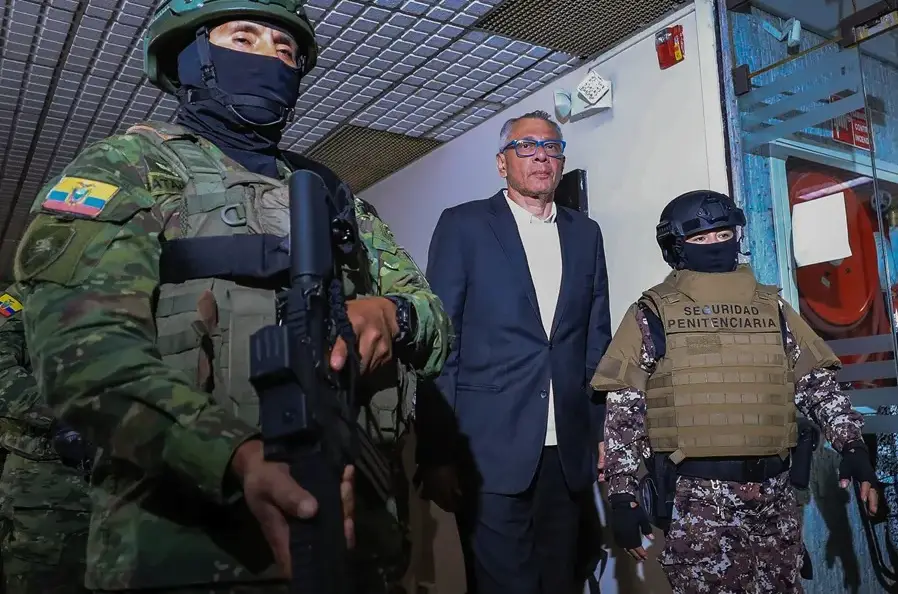Ecuador at a crossroads in its fight against corruption
The year 2025 marks a decisive moment for Ecuador in its struggle against corruption—a phenomenon that can no longer be seen as isolated, but rather as an institutionalized system that has undermined the rule of law, democracy and national development. The recent ruling against Jorge Glas in the Manabí Reconstruction case and the reopening of the Arroz Verde case confirm the persistence of corrupt networks that have transcended different governments and consolidated a structural system of abuse and state capture.
These developments highlight not only the extent of the looting of public funds, but also the vulnerability of institutions to systemic practices of impunity and political shielding. In this context, Daniel Noboa’s administration faces the challenge of dismantling this entrenched web and restoring public trust—not only by prosecuting emblematic cases, but by driving a profound and sustained transformation.
Historical and political context: deep roots of a corrupt system
Corruption in Ecuador is neither recent nor isolated; it is rooted in decades of clientelist practices and state capture that have permeated multiple administrations. However, it was during the Correa decade (2007–2017) that these practices became institutionalized, reaching an unprecedented level of systematization and complexity.
During this period, corruption ceased to be a collection of individual acts and became a structural web involving illicit campaign financing, coordinated manipulation of public contracting, and the co-optation of oversight, judicial and regulatory bodies. This process consolidated a system that guaranteed impunity and maintained clientelist networks by using the state apparatus to serve partisan interests.
The Arroz Verde case, which spans the years 2012 to 2016, illustrates this dynamic. Domestic and foreign companies paid systematic bribes to obtain contracts in strategic sectors, using shell companies, falsified documents, and financial triangulation to hide the illicit origin of the funds. Corruption thus became a mechanism to perpetuate political power and divert resources that should have gone to economic and social development.
The Arroz Verde case: bribery and illicit financing at the heart of the state
The Arroz Verde case reveals how institutionalized corruption operated as an articulated system between public and private actors who profited from state resources through complex schemes. Companies seeking contracts in energy, telecommunications, and infrastructure offered bribes to officials and political operatives to secure awards—even at the expense of the public interest.
To conceal these illicit flows, shell companies issued fake invoices and financial triangulations were used to obscure money trails, including transfers to tax havens and the use of frontmen. The investigation, launched following a journalistic exposé in 2019, linked senior officials including Rafael Correa, Alexis Mera, and Jorge Glas, and identified over $39 million in fiscal damage.
This scheme exposed a vicious cycle: public funds were diverted to finance electoral campaigns and clientelist networks, weakening institutions and undermining democratic governance.
Jorge Glas’s third conviction: corruption in the Manabí reconstruction
In June 2025, Ecuador’s National Court of Justice sentenced Jorge Glas and Carlos Bernal to 13 years in prison and 25 years of political disqualification for embezzlement related to the reconstruction following the 2016 earthquake. The ruling found that they diverted funds to unnecessary projects, prioritizing political and clientelist interests over the needs of victims.
This third conviction confirms a repeated pattern of abuse of power, influence peddling, and the use of parallel structures in public contracting—elements also present in the Odebrecht and 2012–2016 Bribery cases. The trial was marked by controversy, including the refusal to recuse judges and a diplomatic conflict following Glas’s capture, highlighting the complexity and tensions surrounding the prosecution of high-ranking officials.
Institutionalized corruption: beyond individuals, a structure to dismantle
These cases reflect a structure of institutionalized corruption functioning as a system embedded within the Ecuadorian state—characterized by state capture, clientelist networks, co-opted powers, persistent impunity, and the absence of effective oversight.
The evolution of Transparency International’s Corruption Perceptions Index (CPI) confirms this reality. In 2012, Ecuador scored 42 out of 100, but in subsequent years dropped to around 35, reflecting rising public perception of systemic corruption. Despite recent improvements, the levels remain low, underscoring a structural problem.
Reports from the Comptroller General and audits have identified recurring irregularities in public works, healthcare, and telecommunications—including inflated contracts and non-transparent direct awards—corroborated by judicial and journalistic investigations. Impunity and judicial politicization remain major obstacles, undermining legal processes and public trust.
Dismantling this system requires more than prosecuting individuals. It calls for comprehensive reforms to eradicate impunity, strengthen judicial independence, and establish effective accountability mechanisms.
Daniel Noboa’s challenge and the 2024–2028 National Plan for Public Integrity
In response, the administration of Daniel Noboa has taken on the task of confronting corruption through the National Plan for Public Integrity and Anti-Corruption, launched in December 2024. The plan focuses on three pillars: prevention and punishment, transparency and accountability, and citizen participation.
A key feature is the strengthening of the Transparency and Social Control Function, supported by digital systems that enable real-time monitoring of public contracting, facilitating public access to information and the reporting of irregularities. A secure whistleblower channel has been implemented, alongside training programs for public officials on ethics and integrity.
The plan also promotes legal reforms to streamline anti-corruption judicial processes and train judges and prosecutors. It relies on the Public Integrity Law, which sets clear obligations on transparency, conflicts of interest, and asset declarations. This law, along with updated procurement policies, aims to close legal loopholes and reduce institutional capture.
However, judicial independence remains a key challenge. The plan proposes citizen oversight of the judiciary and merit-based selection of judges to counteract politicization. Collaboration between the Comptroller’s Office, the Attorney General’s Office, and the Integrity Secretariat has been intensified, including operations in vulnerable sectors.
Active participation by civil society and the media—such as Transparencia Ecuador—is essential to monitor progress and demand accountability, helping prevent setbacks. The plan also addresses emerging threats such as money laundering through digital platforms and the infiltration of criminal networks, promoting international cooperation.
The plan’s success will depend on the government’s ability to turn these commitments into effective structural reforms that ensure transparency, judicial independence, and strict enforcement.
Conclusion: the urgent need for structural transformation
Corruption in Ecuador is not a deviation from the system—it is the system when institutions are captured, oversight is neutralized, and public power is turned into a tool for private profit. The Arroz Verde and Manabí Reconstruction cases are not anomalies but stark illustrations of a model of governance based on opacity, clientelism, and impunity. Ignoring this structural reality is tantamount to perpetuating it.
Tackling this form of corruption demands far more than punishing individuals. Unless the web that enables its reproduction is dismantled—including the co-optation of the judiciary, the political use of oversight bodies, and informal mechanisms of power allocation—any effort will remain reactive and limited. It is not enough to punish today’s offenders if tomorrow’s operators are allowed to emerge.
Daniel Noboa’s government has both the opportunity and the historical responsibility to break with this past. This requires firm political will, irreversible institutional reforms, radical transparency, and the effective empowerment of citizens and the independent press as real checks on power. Without these elements, the National Plan for Public Integrity risks becoming just another symbolic gesture. Ecuador doesn’t need promises—it needs an ethical refoundation of the exercise of power.
Machine translation, proofread by Ricardo Aceves.












